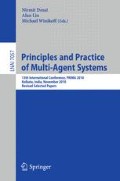Abstract
Autonomous agents are often restricted by the programs that make up their ‘intelligence’ because they are installed on the same hardware as the agent. Since intelligence is software and therefore abstract, it is possible to separate the components which ‘create’ the agent’s intelligence from the agent itself. The disembodiment of intelligence allows agents to access components that may not be suited to their hardware for physical reasons, such as storage capacity or computational complexity.
It has been long established that humans find solutions to problems by dividing a problem into a series or smaller sub-problems [1; 2]. Using web services, ‘intelligence components’ can be created which perform a simple generic task on behalf of a client agent. These components may be used in different combinations in order to create customized solutions for particular problems.
Intelligence components may be distributed across servers in different locations, allowing other agents to benefit from the differing implementations. In addition, software may be updated remotely by updating individual components. The model is aimed at creating a repository of useful functionality which may enable intelligent agents to focus on the process of intelligence rather than processing individual environmental states.
The solution presented demonstrates that an agent may access distributed components in order to control behaviour, taking into consideration that components themselves have no concept of the environment in which the requesting agent exists. The problem of translating a ‘model’ solution into the environment-specific solution is therefore left to the agent.
Access this chapter
Tax calculation will be finalised at checkout
Purchases are for personal use only
Preview
Unable to display preview. Download preview PDF.
References
Michalewicz, Z., Fogel, D.B.: How to Solve It: Modern Heuristics, vol. 2. Spriger, Heidelberg (2004) 3-540-22494-7
Li, D., Du, Y.: Artificial Intelligence with Uncertainty. CRC Press, Oxon (2008) 1-28488-998-5
Matarić, M.J.: The Robotics Primer. The MIT Press, Cambridge (2007) 978-0-262-63354-3
Morgan, S.: Programming Microsoft Robotics Studio. Microsoft Press, Redmond (2008) 978-0-7356-2432-0
Johns, K., Taylor, T.: Professional Microsoft Robotics Developer Studio. Wiley Publishing, Inc., Indianapolis (2008) 978-0470-14107-6
Chrysanthakopoulos, G., Singh, S.: An Asynchronous Messaging Library for C#, California, USA (2005)
Balsdon, Q.J., Ehlers, E.M.: Agent Framework for Self-Embedding Intelligence Components Using Simulated Robotics as a Test bed, pp. 1–200. The University of Johannesburg, Johannesburg (2009); Masters Dissertation
Poslad, S.: Specifying protocols for multi-agent systems interaction. ACM, New York (2007) 1556-4665
Russell, S., Norvig, P.: Artificial Intelligence: A Modern Approach, 3rd edn., 1152 pages. Prentice-Hall (2009) 978-0136042594
Gui, N., De Florio, V., Sun, H., Blondia, C.: A hybrid real-time component model for reconfigurable embedded systems, pp. 1590–1596. ACM, Fortaleza (2008)
Peper, C., Schneider, D.: Component engineering for adaptive ad-hoc systems, pp. 49–56. ACM (2008)
Balsdon, Q.J., Ehlers, E.M.: A Robust, Modular Agent Architecture With Embeddable Components for use In Various Multi-Agent Environments: Applying Simulated Robotics, vol. 2. The Faculty of Industrial Design Engineering, Delft University of Technology, Izmir, Turkey (2008) 978-90-5155-044-3
Burmester, S., Giese, H., Oberschelp, O.: Hybrid UML Components for the Design of Complex Self-Optimizing Mechatronic Systems, pp. 281–288. Springer Netherlands (2006)
Goodrich, M.T., Tamassia, R.: Data Structures and Algorithms in Java, 5th edn. Wiley (2010) 978-0470383261
Capretz, L.F., Capretz, M.A.M., Li, D.: Component-Based Software Development, pp. 1834–1837. Industrial Electronics Society (2001)
Guerrouat, A., Richter, H.: A component-based specification approach for embedded systems using FDTs. ACM, Lisbon (2005) 1-59593-371-9
Author information
Authors and Affiliations
Editor information
Editors and Affiliations
Rights and permissions
Copyright information
© 2012 Springer-Verlag Berlin Heidelberg
About this paper
Cite this paper
Balsdon, Q.J., Ehlers, E.M. (2012). Towards Distributing Agent Intelligence: Using Decentralized Software Services for the Creation of Complex Problem Modelling. In: Desai, N., Liu, A., Winikoff, M. (eds) Principles and Practice of Multi-Agent Systems. PRIMA 2010. Lecture Notes in Computer Science(), vol 7057. Springer, Berlin, Heidelberg. https://doi.org/10.1007/978-3-642-25920-3_24
Download citation
DOI: https://doi.org/10.1007/978-3-642-25920-3_24
Publisher Name: Springer, Berlin, Heidelberg
Print ISBN: 978-3-642-25919-7
Online ISBN: 978-3-642-25920-3
eBook Packages: Computer ScienceComputer Science (R0)

